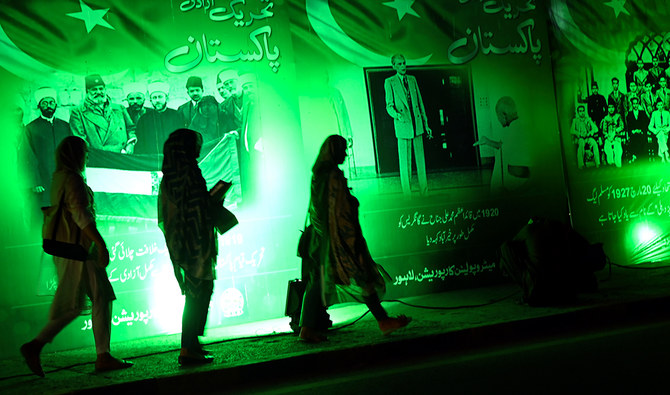KARACHI: As Pakistan marks 76 years of its independence from British rule on August 14, Arab News asked a wide cross-section of women what independence meant for them and what needed to change in their country to make them feel truly independent and secure in the private, professional and public spheres.
According to the Global Gender Gap Index Report 2022, Pakistan ranks 145/156 for economic participation and opportunity, 135/156 for educational attainment, 143/156 for health and survival, and 95/156 for political empowerment. The World Economic Forum’s Global Gender Gap 2022, ranks Pakistan higher on political participation at 95/146 as more women than ever before are participating in political activity.
Women, however, continue to remain underrepresented in leadership roles and are restricted from taking up positions in the political and public sphere due to systemic challenges arising from patriarchal norms. Pakistan is also ranked as one of the top ten countries most affected by climate change in the past 20 years, with women being affected the most.
Women Arab News spoke to in Pakistan’s largest city, Karachi, said 77 years after independence, ordinary Pakistani women were still “fighting for the most basic rights.”
“I don’t think there is any sort of independence for women in our society. Even if you are a working woman, you step out for work, you are harassed,” Iqra Afzal, a 33-year-old nurse, said.
“Nothing has changed [in the last 76 years] except that women have gotten educated and are demanding progress … They have become aware.”
Kiran Fatima, 25, said women would celebrate “independence” when they could feel physically secure.
“We see young girls of ages 10-12 being abused,” Fatima, a housewife, said. “This is independence?”
However, she agreed that women were now “freer than in the past” and had more liberty to find and pursue work.
“Circumstances have gotten really better, they have started to roam around, move around. This wasn’t the case earlier,” Fatima said. “Daughters in the past weren’t allowed to leave the house. Now people say, ‘You will achieve something if you step out’.”
For 37-year-old Fiza Salman, the onus lay on women to go out and claim their rights, saying independence was a “mindset” and women could do a lot if they had the will.
“If you’re free, [you do] whatever you like to do. Nobody can stop me from doing what I want to,” Salman, a banker by profession, said.
“For women, it has gotten better 100 percent. People’s exposure has increased, new platforms have opened, and they have gotten opportunities.”
Mishkat Saleem, a 20-year-old Pakistani MBBS student, said she felt “independent as a woman living in Pakistan” but said families and the government needed to support and enable women more.
“The area I belong to KP (Khyber Pakhtunkhwa province), I have seen girls do not have as much freedom,” Saleem told Arab News, referring to the conservative northwestern province.
“I think people’s perspective needs to change. Our country is left behind because of these things. We should educate girls and fully support them so they can stand on their feet. Our country will also flourish because of it.”
But Saima Siddiqui, who works as a principal at a private school, had no hope and said she did not consider Pakistan “independent” for women.
“There is no freedom of speech, there is no freedom to work, there is harassment, there are no opportunities for women,” she said, as she walked out of a mall.
“I am not satisfied with this country at all. If I get an opportunity, I will move abroad.”



















